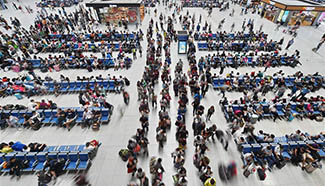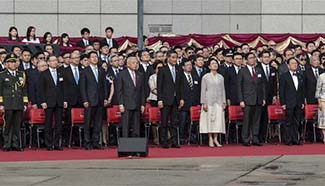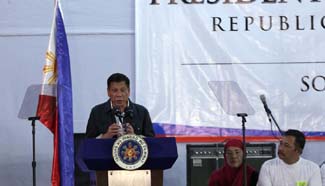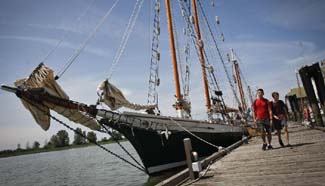SEOUL, July 1 (Xinhua) -- The Philippines has disregarded its legal duty in international law by unilaterally bringing the case of South China Sea dispute to The Hague, which has no jurisdiction over issues of territorial sovereignty, a South Korean law professor said.
"The Philippines disregarded all of its legal duties in international law and, unilaterally brought the dispute before the (Arbitration) Court even without consideration of the 1992 Declaration," Kim Hyun Soo, law school professor in South Korea's Inha University and visiting professor of China's Wuhan University, said in an interview with Xinhua on Thursday.
According to Kim, the Association of Southeast Asian Nations (ASEAN) members signed the ASEAN Declaration on the South China Sea in 1992, declaring that they shall use friendly consultations and negotiations to resolve territorial disputes.
In 2002, ASEAN members and China signed a political statement known as the Declaration on Conduct of Parties in the South China Sea (DOC), confirming the friendly negotiations contained in the 1992 declaration.
The Philippines is required to proceed to an exchange of views, the professor said, to settle the dispute through negotiations or other peaceful means in the UN Convention on the Law of Sea (UNCLOS), but the Southeast Asian country took the unilateral action, which is not in line with the international agreement between China and ASEAN members in 2002.
A disputing party may bring a case before the international court or tribunal, but the disputing parties have a legal duty to consult with each other before filing the cast to the court, Kim said, noting that peaceful settlement through dialogue should be favored because all parties to the UNCLOS shall settle any dispute by peaceful means.
According to the UN Convention, any peaceful means chosen by the parties shall be respected, so the Philippines' unilateral action has no legal ground in international law including a regional declaration between China and the ASEAN in 2002, the professor said.
"The People's Republic of China has already declared it does not accept compulsory procedures of disputes regarding maritime boundary delimitation and military activities in article 298 of the UN Convention," said Kim.
Kim said China has no any legal duty to attend in the legal procedures of the arbitration court or accept the award of the court, and that China has a legal authority to deny the court's legal procedures.
The UN Convention clearly prescribes the parties have the right to declare optional exceptions to applicability of compulsory procedures entailing binding decision, so the government of the Philippines and the arbitration court should respect the declaration made by China in 2006 based on the convention, the professor said.
Asked about the U.S. pivot-to-Asia strategy, in which U.S. navy assets are increasingly deployed around South China Sea, the professor said the United States seem to want to secure a safe and unhindered passage in South China Sea for their strategic and military purposes and interest.
Kim noted that most of the areas in South China Sea are disputing and overlapping claimed zones among the concerned parties and that all ships need to carefully gain approval in order not to penetrate into claimed countries' territorial seas or internal waters.
The professor added that claims for the free passage of ships, particularly warships, even in the exclusive economic zones or territorial waters of foreign countries would be harmful to resolve the South China Sea dispute because regional countries including China may feel threats by the foreign warships' free passage through their territorial waters.











